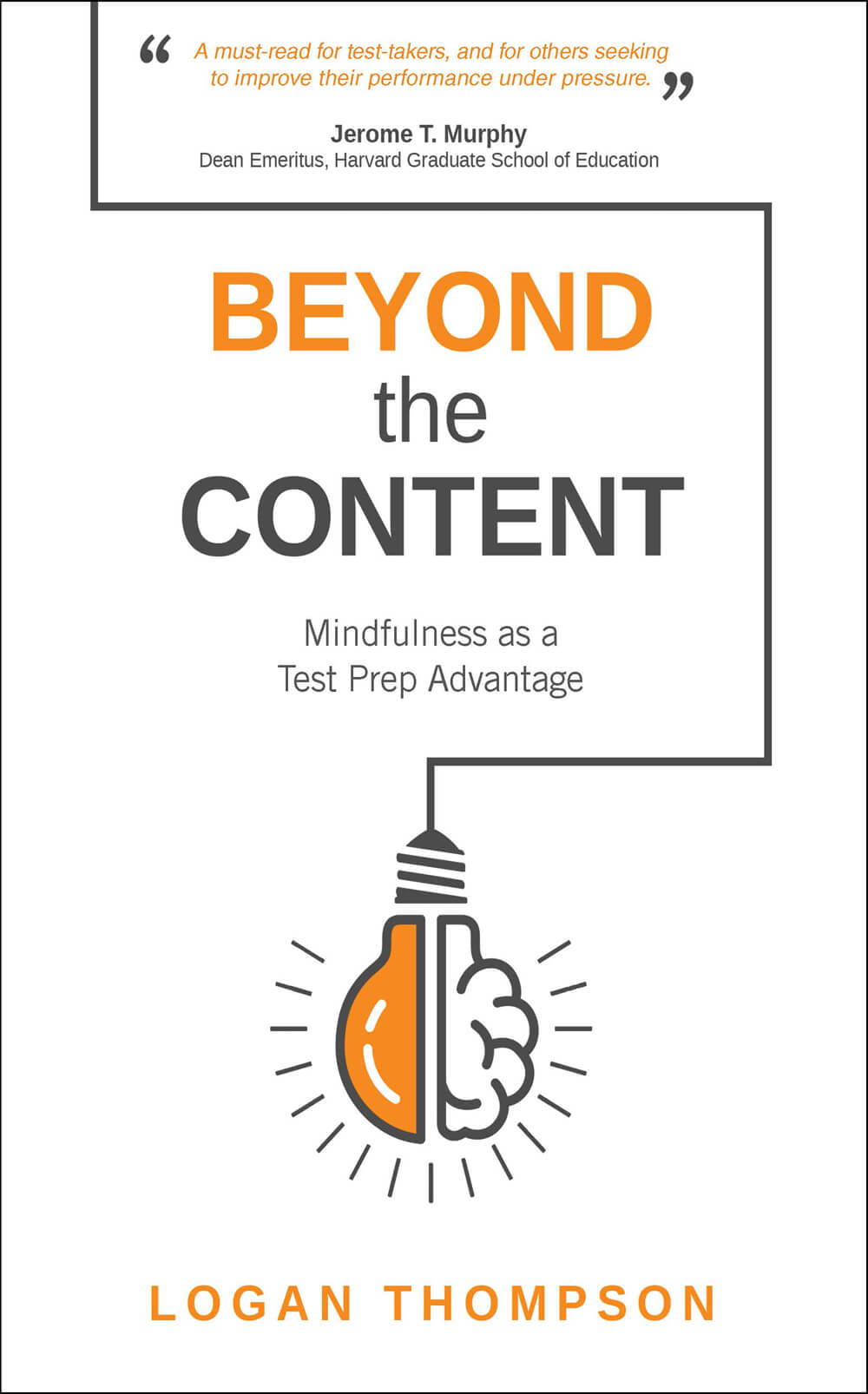“That tanks your score.” Test prep expert and author of Beyond the Content: Mindfulness as a Test Prep Advantage Logan Thompson tells SocratesPost what most people miss about test prep, the surprising reason why your score isn’t as high as you want it to be, and what to do about it.
Exclusive Insider Interview: Test Prep and Mindfulness Expert, Logan Thompson
SocratesPost: How do you like to introduce yourself, Logan?
Logan Thompson: I’m someone interested in helping people explore how to optimize their own performance. And the niche that I’m working in is using mindfulness-based tools and a framework I developed to help people preparing for mental performance situations, such as standardized tests, explore what I call “the other half of test prep,” which is this landscape of thoughts and emotions that are simultaneously occurring with the content-related material in front of them.
SocratesPost: How did you discover mindfulness in test prep and realize you needed to write a book on it?
Logan Thompson: I first learned about mindfulness when I was 21. I read a book called The Power of Now by Eckhart Tolle as well as a book called Wherever You Go, There You Are by Jon Kabat-Zinn. Those were my first intellectual introductions to the possibility of someone recognizing their own thoughts and recognizing when they’re in thought, whether in future or past mental fantasies, and being able to call themselves back to the present moment. I found that really empowering and fascinating. Now, I didn’t think about passengers or drivers or incorporating it into test prep until 10 years later when I was living at a meditation center and teaching test prep for Manhattan Prep. That’s when I saw the opportunity to utilize some of the mindfulness-based techniques with my test prep students.
SocratesPost: How did you manage teaching test prep and living at a meditation center?
Logan Thompson: I was teaching remotely and driving into Boston during the week. The meditation center was in the middle of central Massachusetts. At the time I was teaching mindfulness to prisoners and teenagers on teen retreats and at a local prison. I was also teaching test prep, and that’s when I decided to use some of the mindfulness techniques in the classroom.
SocratesPost: Give us a little peek into your life today. What does your typical day look like?
Logan Thompson: I recently graduated with a Masters in Human Development and Psychology from Harvard, and my past year has been largely spent studying. This summer, I’ve been teaching test prep, and still doing one-on-one coaching for mindfulness independently. I’m still incorporating mindfulness into the test prep classroom.
SocratesPost: In what ways has knowing how to be mindful helped you in your graduate studies?
Logan Thompson: Well, mindfulness allows me to pay attention to what my mind is doing. It allows me to notice if my mind is wandering or present, first of all, and second of all, if it’s wandering, mindfulness allows me to pay attention to the types of dialogue and stories that my mind is telling me. There are two ways that can help when I’m trying to organize my day or keep my studies in a disciplined way. One is just simply awareness of when my mind is present or wandering. The more frequently I’m aware of when it’s wandering, the more frequently I can bring it back. Now the second part is when it is wandering, I can pay attention to what types of messages my mind is giving me. Some could be just innocuous daydreams, or some could be self-defeating stories. And it’s important for me to notice those because then I can step out of believing those stories and just recognize that it’s my mind trying to discourage me.
SocratesPost: What’s an example of your mind trying to discourage you?
Logan Thompson: For example, this happened while I was writing the book. When I would start a chapter, or pretty much any sentence, there was a subtle voice telling me “That’s not good enough,” or “This is not as good as another author,” or “You’re being an imposter,” or “You’re never going to finish this book.” Now, there’s nothing wrong with those thoughts if I was able to notice them and then not believe them. But sometimes if I wasn’t being very mindful, I wouldn’t notice the thoughts for a while. And those thoughts would run wild for about 10 minutes. Suddenly, I was wrapped up in a story about my own inadequacy, which has emotional and physical consequences. So, being mindful of the mind wandering and the negative messages was helpful in stopping the negative cycle.
SocratesPost: That’s a great way to segue into your new book. Many of our readers haven’t read it, so how would you describe the underlying argument of your book?
Logan Thompson: I’d probably start with a metaphor of sports. Think about how silly it would be to prepare for a competitive sport, but only learning the skills of the sport and not conditioning your body. No one thinks of it that way, right? But that’s precisely the approach most teachers and students take towards standardized test prep. We only prepare them on the skills, the content, the strategy of what they’re being tested on, but we don’t talk about that very vehicle through which those content and strategies need to be downloaded and then recalled. That’s the mind. We don’t talk about what I call “this other half of test prep.” So, we’re leaving 50% on the table unexplored. If we don’t acknowledge this other half of test prep, people are not performing at their best. This book is an exploration and a start of the conversation about this other half of test prep.
SocratesPost: What’s a sign that someone is oblivious toward the oftentimes ignored “other half of test prep,” as you call it?
Logan Thompson: One hint or one symptom of somebody perhaps needing to explore this other half of test prep is if they’ve ever performed worse on a test than the amount of content that they know. What I mean by that is, if they think they know 80% of the content on a test, yet they score lower than an 80%, there’s something else going on.
SocratesPost: What’s another hint someone should be investigating the mind’s influence on test prep results?
Logan Thompson: Another symptom is that if they score worse on official tests than they do on practice tests, that means there’s something else happening besides not knowing the content. What most students do when they see this set of data of performing well in practice test or studying and then poorly when the pressure is high, is they come to the conclusion, “I’m just a bad test taker.” And that’s an unfortunate label because what does it actually mean? It doesn’t really make much sense, because most of these people will perform well on a practice test. What does it mean if you’re a bad real test taker? That you suddenly forget the content? No, it’s a misidentification of what’s actually happening, which is not having explored or worked on or mastered this other half of the test prep. There’s something else going on with the mental and emotional and physiological way that people show up during performance. And that’s just as important to work on and explore as it is for an athlete to explore the weight room.
SocratesPost: One way you explained the “other half of test prep” in the book is by using the terms “passengers” and “drivers.” Can you explain how those relate?
Logan Thompson: The framework of passengers and drivers is a tool that is not a complete physiological neuroscientific truth. It’s just a helpful way for people to frame and make sense of the often-competing narratives and themes we have mentally and emotionally. The current situation in most of our minds is they’re just a bunch of messages. But whichever messages happen to be occurring in this moment, students take that as truth. If their mind says I’m great, they start to believe they’re great. If their mind says they suck and they’re never going to get into school, they believe that voice. That’s a problem because that gives ultimate, unchecked, unvetted truth to random neural firings of habitual thoughts that come up.
An analogy of this would be if some stranger came up and started telling you a bunch of things about yourself. Would you believe them? Or would you question it all? We need to take that amount of scrutiny towards our own thoughts, because many of them aren’t founded in some ultimate truth, they’re just habitual thoughts. And one way to help frame that is we can call the thoughts that don’t give us messages that inspire us “passengers.” We all have passengers and all that means is frequent arising of different types of themes of thoughts. One example of a theme could be, “I’m not good at math. If I get this problem wrong, I’m definitely going to get the next problem wrong.” Or “I’m never going to be as good as my sister,” or “I’m a bad test taker,” or whatever it is, these are their frequent occurrences. Now, what I’m calling the driver is the occurrence of those thoughts and emotions that generally happen when we feel safe, not threatened. It’s typically the part of our self that arises when we see someone else that we care about in need. We feel like “ourselves.” Again, this is not an ultimate commentary on who we are or the self; it’s just a helpful way to frame what’s happening in our experiences. Now, the benefit of that is when we recognize passengers, we’re able to notice them as a passenger, rather than an ultimate truth. And what that does is two things: one, it helps us realize that the message is not necessarily true; and two, it allows us to form a different relationship with these self-critical and hindering themes of thoughts and beliefs.
SocratesPost: What happens if students are receiving unhelpful messages from parents while they’re preparing for college admissions?
…it’s also really crucial for parents, teachers, and counselors, to be aware of their own thoughts and passengers, because their thoughts can do double the harm than a student’s can.
SocratesPost: Was there ever a time when your students seemed to be doing great at practicing mindfulness during the practice test, but they still got an undesirable result on the test?
SocratesPost: How do you know when a student has gotten enough consistent practice to predict that they would pretty much perform the way they want to on the actual test?
SocratesPost: It sounds like the missing link between great mindfulness practice and, of course, content strategy as well. And great performance is just doing it enough and doing it enough under a higher pressure environment.
SocratesPost: One part of the book also talks about the merits of watching your thoughts instead of reacting to them right away. Sometimes a test taker might react positively because they know the answer to a question. Are there ever times when reacting is okay and beneficial?
SocratesPost: It seems like you’re really distinguishing the reaction versus what happened as a result of having a reaction which could be spiraling into negative thoughts about yourself, and then the fight or flight response. Is that right?
Stay tuned for the rest of our interview with author, Logan Thompson!


